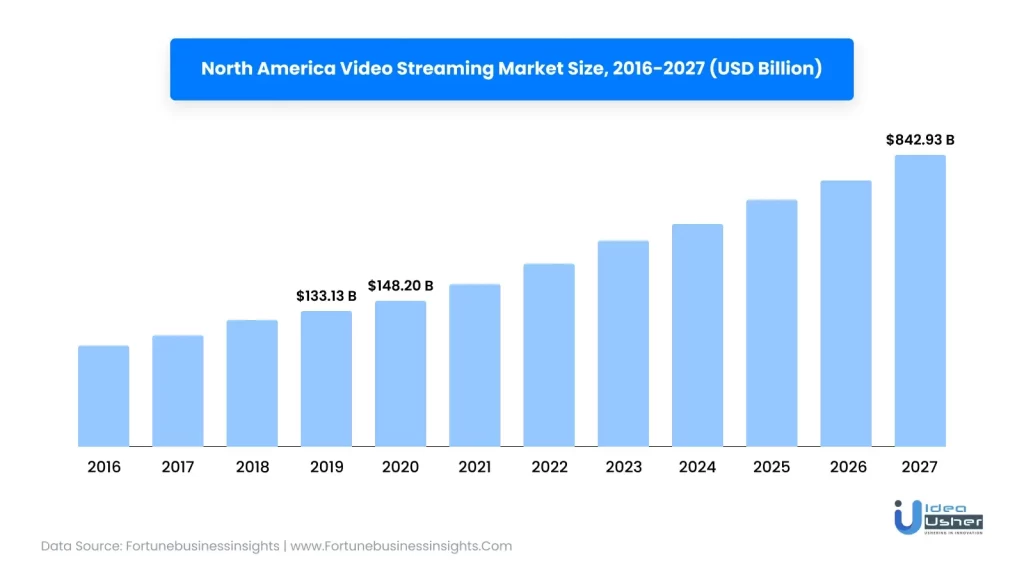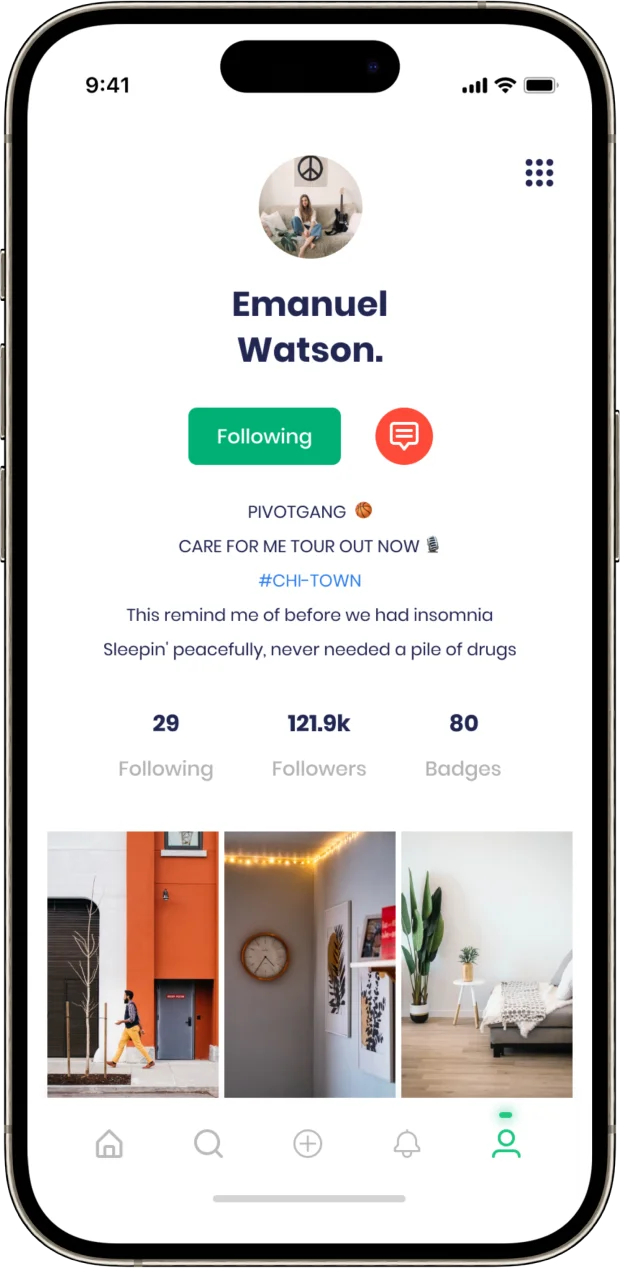All the videos you watch online are delivered via streaming technology. The technology allows people to access online content without downloading it on their devices.
Compared to TV broadcasting, video streaming apps offer better accessibility as their content can be accessed online anytime, anywhere.
Businesses from multiple industries can greatly benefit from media streaming app development and can better engage their audience.
The global video streaming market size is expected to reach USD 416.84 billion by 2030, registering a CAGR of 21.5% from 2023 to 2030, according to a new report published by Grand View Research, Inc.
In this article, understand the key concept and facts you should be aware of before starting video streaming application development for your business.
What is a streaming app?
The app utilizes hardware and software to transmit video content to viewers. These platforms enable the real transmission of videos, including the following components:
- Video encoders to compress large files,
- Video transcoders to enable multi-bitrate and adaptive bitrate streaming,
- A content delivery network(CDN) that region-wise distributed for delivering content to users via the nearest server,
- HTML5 video player, the most popular video player that replaced Adobe’s Flash Player.
There is an endless possibilities regarding the use cases of online telecast apps. Organizations from multiple industries, such as education, sports coverage, healthcare, concerts, etc., can use this technology to engage their users.
Also, you can target another business as well with your app. Check more about its market stats.
How profitable is it to invest in this industry?
Check out the stats and facts of the streaming industry to understand why it is profitable to invest in building your online telecast app in 2025.

- According to Fortune Business Insights, the industry of online telecast apps would be worth $842.93 B by 2027.
- Millennials and Gen X adults had the highest rate of binge-watching.
- In 2021, it was found that 67% of U.S. households had a paid TV subscription.
- Around 85% of U.S. households now have at least one subscription to such apps
- 55% of people use an ad-supported video streaming service.
Check out the popular types of streaming platforms to select the best one for your business.
How many types of streaming apps are there?
The apps are of 4 types:
1. Live broadcasting apps
The most popular category where users can broadcast and record video simultaneously. This app allows users to watch real-time events without needing to download them. Talk over popular apps; it includes Facebook live, Live stream, YouTube Live, Twitch, and much more.
2. Audio streaming apps
The purpose of this app is the same as broadcasting apps, but only audio is allowed to be broadcast and recorded in this case. These apps allow users to enjoy real-time music without needing to download it. Talking over popular audio apps, you can check Spotify, Apple Music, Pandora, Tidal, etc.
3. Video on Demand (VoD) streaming apps
With video-on-demand streaming; the user can watch their favorite TV shows online whenever they want. This app offers functionalities such as resume, rewind, and pause. Most of these apps are subscription-based, for example, Netflix, Amazon Video, Disney plus, HBO Max, and Hulu.
4. TV live streaming apps
These apps allow users to stream their favorite TV shows online. These apps offer exclusive shows and channels only available through on-demand video streaming services. These apps have exclusive TV live streaming plans, such as Amazon Prime Video and YouTube TV.
let’s check out some of the top streaming platforms making millions right now.
Top 5 video streaming platforms
Here is the list of platforms performing well in the market.
1. Netflix
The most popular streaming platform that has over 15,000 titles. They cover their focus on the entire audience based on gender, race, age, and gender.
Its algorithm smartly analyses their user browsing better to let them suggest content relevant to their interests. Also, Netflix offers super hit exclusive titles that help them to attract a large audience.
| Started in | 1997 |
| Headquarters | United States. |
| Market valuation | 119.74 billion |
| Audience base | 223 Million |
| Available on | Smart TVs, game consoles, streaming media players, set-top boxes, smartphones |
| Pricing | Basic: $9.99/monthStandard: $15.49/monthPremium: $19.99/month |
2. Prime Video
The platform launched by the biggest e-commerce brand, Amazon. It offers unlimited access to its video content library through subscription, where its additional content can be avail either by rent or purchase.
| Started in | 2006 |
| Headquarter | United States |
| Market valuation | 13 billion |
| Audience base | 157.4Million |
| Available on | Smartphones (Android & iOS), Gaming consoles, Mobile Devices, SmartTVs, etc. |
| Pricing | $14.99 per month$139 per year |
3. Disney +
The company with exclusive TV shows and movies, especially for children, has created its video streaming platform.
Disney + has partnered with content providers such as Marvel, Pixar, Star Wars, and National Geographic to offer their audience a wide range of content.
| Started in | 2019 |
| Headquarter | United States |
| Market valuation | 290 billion |
| Audience base | 221 Million |
| Available on | Android smartphones and tablets, Apple iPhones and iPads, Amazon Fire Tablet |
| Pricing | $7.99 per month |
4. HBO Max
The company has managed to offer exclusive content to its platform by partnering with WarnerMedia. It offers popular shows and movies like House of Dragon, Walker, the vampire, directs, etc.
| Started in | 2017 |
| Headquarter | United States |
| Market valuation | 7.7 billion in 2021 |
| Audience base | 76.8 Million |
| Available on | Android, iOS, Amazon Fire TV.Android TV, Apple TV, Chromecast, LG Smart TVs |
| Pricing | $7.99 per month |
5. Youtube TV
A famous content creation platform where everyone can become an influencer.
Along with its regular platform, the brand has also launched “YouTube TV” as a separate video streaming platform where it offers its exclusive content and 85 television channels.
| Started in | 2020 |
| Headquarter | United States |
| Market valuation | 28.8 billion in 2021 |
| Audience base | 5 Million |
| Available on | Android, iOS, Google Chromecast, Apple TV, Fire TV, and Roku players & TVs, etc |
| Pricing | $7.99 per month |
What are essential features to have in a streaming app?
Here is the list of features that top apps use nowadays. However, you need to implement separate features for the panels discussed below.
I. User panel
These are the following features you can add for your users
Adaptive video streaming
The feature continuously analyzes the network to detect any fluctuations in the bandwidth, and it automatically adjusts the video quality to ensure your platform can offer a flawless streaming experience.
Video sharing
The feature will let users share their favorite TV shows and videos with their online friends across social media platforms. Video sharing will help boost your app’s engagement level and attract more potential audiences that love streaming online content.
View offline
Allow users to stream their favorite TV shows and movies without the internet. With offline viewing mode, users can download their favorite shows and access them offline anytime, anywhere they want.
Quick search & filters
Help your users quickly find their favorite shows and movies on your platform by implementing the features of a quick search and filter. You can add tags of popular movie categories and genres, by which users can quickly find shows relevant to their interests.
II. Admin panel
Admin will use these features to offer the best streaming experience to users.
Ad-Incorporation
With the help of a smart and robust admin panel, the admin can integrate various ads in the app to boost sales and revenue.
The feature will let you integrate various ads to boost app sales and revenue on your platform. You can use this feature to customize the ad experience and make income on full potential from your app users.
Dashboard
Track your platform progress by analyzing the complete information with a fully featured dashboard.
The dashboard will provide real-time information about your audience, watch time, favorite shows, and others. You can use such information to offer your audience a more personalized experience.
Discounts & offers
This feature will let you launch new promo codes and coupon deals on your platform. It is best for you to use this feature to attract more audiences to your app.
You can manage all the campaigns you are running on your platform with discounts and offers and can offer promo codes from this feature to new users.
What are the steps involved in creating your app? Know in detail.
Steps to create a video streaming app
The following steps will explain the development process:
Step 1: Find your niche
Since online telecast apps have dominated multiple industries, it would be best for you to target a specific industry. You can choose your unique target audiences, such as kids, adults, or women, and offer them TV shows and movies based on their interests.
Step 2: Pick a monetization strategy
In which way you are going to make money from your video online telecast app will determine the overall business model of your streaming platform. There are multiple monetization options available such as.
- Paid app, where users simply pay to download the app.
- Subscriptions, in which users pay a fee either monthly or annually to use the video streaming service
- Advertising space, where your platform will be free to use, and you will make money by showing advertisements of other businesses on your platform.
You can use the combination of different monetization models to generate income at its full potential from your streaming services. Contact an app development agency, as they will help you suggest the best options to make money from your app.
Step 3: Pick a suitable team
You will need guidance from an experienced app development agency to help create all the required features and functionalities for your app.
Multiple options are available, such as hiring freelancers or in-house developers.
These options have drawbacks, such as in-house developers requiring more budget and freelancers leaving your project in the middle in case they face difficulties or get offers from other clients.
Outsourcing your project to app developers makes sense as they consist of all required professionals, such as business analytics, front-end and back-end developers, UX experts, graphic designers, and project managers.
Step 4: Pick the right tech stack
In addition to the programming languages, online telecast app development will require components like
| Media processing platform | AWS Elemental Media Convert |
| Server | Amazon EC2, Amazon EKS / AWS Lambda |
| Storage | Amazon S3 |
| Streaming protocols | RTMP, M2TS, Apple HTTP Live Streaming, WebRTC, RTP/RTSP |
| Database providers | Amazon RDS, Amazon DynamoDB |
| Messaging queues | Amazon SQS |
| Managed live streaming | Amazon IVS, AWS Elemental MediaLive, DaCast, Wowza |
| Managed chat for streaming | Amazon IVS |
| Push notifications | Firebase notifications |
| Content delivery network | Cloudflare/ Amazon Cloudfront. |
| API server | Node.JS |
Step 5: Choose a CDN
Student stands for Content Delivery Network, which you will need to build your live app. This will help you to offer content without interruptions.
CDN stores the content in a nearby location of your end users, which can help you offer fast content delivery to offer them a better streaming experience. CDN reduces streaming latency. A latency is a time delay between when a video is requested and when it starts playing.
Multiple CDN are available. However, we suggest you go with the popular ones that we have mentioned below:
- Akamai CDN
- Akamai CDN
- Fastly CDN
- Cloudflare CDN
Step 6: Select the best hosting
The main purpose of hosting services will be to offer smooth streaming services to your customers. The hosting services will handle your online users by allowing them to stream their favorite shows on your platform.
Each hosting service comes with its traffic handling capability, so it will be best for you to upgrade your hosting services when you experience a great increase in the user base on your platform.
We will suggest you go for Amazon S3, which is a readymade cloud solution that will fulfill the hosting requirement of your video streaming platform.
Moreover, discussing your project with an app development agency will help you select the best hosting services to take your streaming platform online.
Step 7: Choose a storage service
To make all the shows and movies accessible online and ready to watch, choose a reliable storage service where you will store all your content to allow your users to access them online anytime they want.
Step 8: Understand legal requirements
To start your streaming platform business, you need to comply with various legal regulations based on your targeted country.
You should comply with data protection regulations such as GDPR or CCPA to store your users’ personal data on your platform.
Step 9: Work on the UX/UI
This is the development part where the team will start working on creating the user interface of your app. You can take inspiration from the best streaming platform to implement the same design or better on your app.
Try to implement a simple user interface to help your user access all the available features to stream on your app.
It will be best to start creating a prototype where you will get the actual idea of how your platform will look after it becomes fully functional and ready to launch.
Step 10: Build & add features
All the streaming platform consists of common features such as live video streaming, payment gateways, add to favorite, quick search and filters, pause and resume video, and much more.
Creating a list of all the features you need on your app will be the best.
However, you can best do market research on your competitors and targeted audience to develop unique features that will give a competitive advantage to your streaming business.
When working on the backend part of your app, ensure:
- The team has implemented all the popular payment options to help your user’s video stream subscriptions from your app based on their payment preferences.
- The app also has an offline streaming option, where users have first to download their favorite shows so they can access them even without the internet.
- The platform comes with social media integration where users can share their favorite content with their online friends.
Step 11: Prepare MVP
MVP stands for a minimum viable product. This would be the first version of your app that will come with only the basic and required features to make your app fully functional.
Creating MVP will help you minimize your app development budget. Later you can extend the functionality of your platform by adding more new features.
Step 12: Test your app
To ensure your platform is lag free and free from all technical glitches. You should perform testing of your app.
You can perform beta testing, allowing a few users to test your platform so you can modify your platform based on their feedback and review.
When doing app testing, ensure
- All the available content can be easily played on your platform.
- The integrated payment services are working well.
- The content can be searched easily with search filters.
- Users can share their favorite content online across different social media platforms.
Step 13: Launch and promote among your audience
Now, your platform is ready to launch. You can perform different marketing practices to attract your potential audience to your platform. Ensure you follow all the guidelines of different platforms, such as Google Play and an Apple store.
While for websites and different devices, try to implement best practices to offer a great experience with your video streaming platform.
Consider the following tech stack when building your platform for accessing online content.
Essential tech stack for streaming app development
There are five essential tech stacks for building your online telecast platform:
1. Queueing system
The platform requires an appropriate queueing system for the processing framework. You can choose from Apache Kafka or Amazon SQS as the two main options for queueing systems. These can be used to ensure fault tolerance processing that provides secure storage and effective geographic distribution of video content.
2. Streaming protocols
There are two main popular protocols one is RTMP Which can be used for high-definition streaming, and WebRTC which supports real-time communication. With RTMP, you can allow the transmission of high-quality audio, but it has a longer processing time than WebRTC.
3. Storage system
Having reliable storage is essential for video streaming development. Using cloud services will be a great choice in this case as it will offer distortion-free content streaming without any failures.
4. Content Delivery Network (CDN)
Having the right CDN will ensure the availability and good performance of online telecasting. CDN places the content on servers near the user’s location.
AWS Cloudfront is the popular option used by many platforms, including Netflix. However, if you need to build an interactive live-streaming platform, then Agora.io may be suitable in that case.
5. Media player
Choose the platform where you want to run your apps, such as web, mobile, or smart TV. There are different options available that support HTML5 streaming. Moreover, open-source software also supports HTML 5 media players.
Check out the best content streaming and OTT platforms to get ideas and inspiration for your app.
How can Idea Usher help your business grow?
Take your business to the next level with Idea Usher’s custom web development service. Our team of experts will work closely with you to build a complete streaming platform for your business.
From easy navigation to efficiently managing content, our team will provide an efficient platform where you can easily distribute your content and perform live streaming among your audience.
You can schedule a free consultation call with our team to understand how we can help your business grow.
Work with Ex-MAANG developers to build next-gen apps schedule your consultation now
FAQ
Q. How does a video streaming app work?
A. These apps continuously transmit audio and video files from a server to a client. On such apps, the content is sent in a compressed form over the internet. Later it gets streamed in real-time when it arrives on the viewers’ screens.
Q. How would you design a video streaming application?
A. You can follow the given steps to create your own app:
- Do market research & pick the niche for your content
- Decide monetization model
- Hire app developers to build your app
- Select tech stack
- Choose the best CDN, hosting, and storage service
- Start working on the front end and back end part
- Make the MVP of your streaming platform
- Test & launch your platform
Q. Which server is best for video streaming apps?
A. Here are some of the best apps:
- Plex
- Stremio
- PlayOn
- Media Portal
- Serviio
- OSMC
- Kodi
- Jellyfin
Q. How do you monetize a video app?
A. You can monetize your video app by choosing from the following business models.
- SVOD (Subscription Video on Demand)
- TVOD (Transactional Video on Demand)
- AVOD (Ad-Supported Video on Demand)























